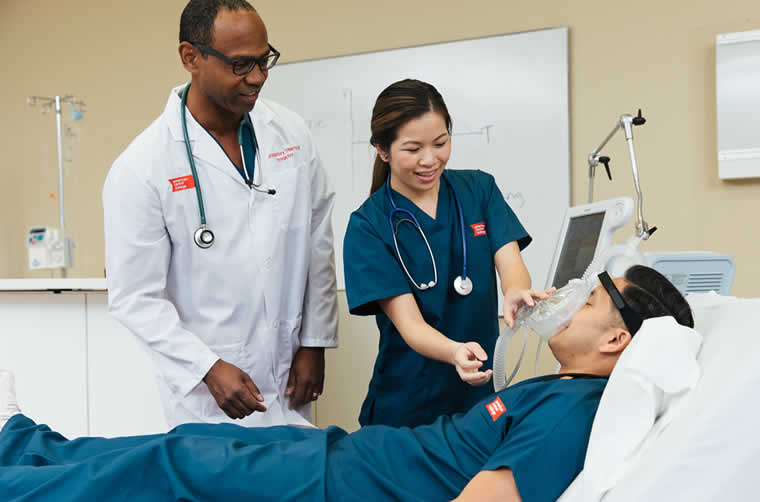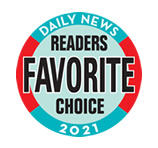- Home
- Programs[+]
- Getting Started[+]
- Why ACC[+]
- Locations[+]
- Newsroom[+]
- Contact Us

If you are a hands-on problem solver and enjoy helping others, a career as a Respiratory Therapist could be the path for you! Respiratory Therapists (RTs) play an important role in patient care.
Looking for the right respiratory therapy program? At ACC, our focus is on your success! Our Associate of Occupational Science Degree in Respiratory Therapy program can help you graduate with the confidence and the qualifications you need to begin your career as a Respiratory Therapist.
Find a respiratory therapy program near you. Our program is available at our Southern California campuses: Los Angeles, Ontario and Orange County.
Our Respiratory Therapy program can be completed in as little as 20 months.
This program is taught in a blended format combining online classes and in-person instruction.
Want to learn more about ACC?REQUEST MORE INFO Want to check out a campus?SCHEDULE A CAMPUS TOUR
"RT is just so rewarding. I get to be right there at patients’ bedside, helping them get through one of the hardest times in their lives."
It only takes a minute to take the next step towards a satisfying career! We've streamlined our online application. See for yourself!
The American Career College Respiratory Therapy (RT) program is designed to help you acquire the knowledge and training to evaluate, treat and care for patients with breathing or other cardiopulmonary disorders. Respiratory Therapists care for a variety of patients, both young and old, whose lungs are not fully developed or may be diseased.
The Respiratory Therapy Program at ACC offers a combination of classroom, laboratory and clinical studies that will allow you to develop a range of skills relevant to the roles and responsibilities of a Respiratory Therapist, which include the following tasks:
Through the respiratory therapy program, we aim to help you graduate with the confidence and qualifications you need to begin your career as a RT.* After successfully completing the RT program, you will be eligible to sit for the Certified Respiratory Therapist (CRT) and the Registered Respiratory Therapist (RRT) exams (written and clinical simulation), offered by the National Board for Respiratory Care (NBRC). **
Programmatic outcomes are performance indicators that reflect the extent to which the goals of the program are achieved and determine which program is effective. The Respiratory Therapy (Associate of Occupational Science) programs in Orange County (200554) and Ontario (200566) are programmatically accredited by the Commission on Accreditation for Respiratory Care (CoARC).** / www.coarc.com
Programmatic outcomes data reported on the (COARC) website include the following data:
** CoARC accredits respiratory therapy education programs in the United States. To achieve this end, it utilizes an ‘outcomes based’ process. Programmatic outcomes are performance indicators that reflect the extent to which the educational goals of the program are achieved and by which program effectiveness is documented. CoArc Website
Our admissions advisors and financial aid advisors are here to support you. They can help you figure out the respiratory therapy school cost and help you explore financial aid options.
To learn more about ACC’s Respiratory Therapy program cost, access our tuition info.
Financial aid and scholarships are available for those who qualify.
Find a respiratory therapy school near you! Our accredited Respiratory Therapy training program is available at two of our Southern California campuses:
Respiratory Therapists generally work in hospitals, clinical settings, sleep disorder clinics, Physicians’ offices, or rehabilitation centers.1 Successful completion of the American Career College Respiratory Therapy program requires clinical experience, where you may work with patients who have a variety of ailments and conditions that prohibit their cardiopulmonary system from working correctly.
Many area employers are very familiar with the quality of ACC's health care training programs and our school's track record for preparing confident, qualified professionals for rewarding careers.
A few interesting facts2 about respiratory therapy careers:
1California Employment Development Department OCC Guide, Respiratory Therapists in California
2Bureau of Labor Statistics, U.S. Department of Labor, Occupational Outlook Handbook, Respiratory Therapists
The curriculum in the Respiratory Therapy program is divided into eight, 10-week quarters. Students will begin with general education, anatomy and physiology, and core respiratory therapy and conclude with clinical practicum courses.
Clinical experience in an appropriate hospital or clinical setting is required for successful completion of the school's program. These clinical rotations, which begin in quarter five, comprise a total of 960 hours.
Respiratory Therapy core courses include the following:
Other core courses in this program include the following:
|
|
You’ll be on your way to helping others!
Respiratory therapists treat and care for patients with breathing or other cardiopulmonary disorders. Our Career Services team will provide you with resources, support, and personalized assistance during your job search.
As an entry-level Respiratory Therapist, day-to-day responsibilities may include the following*:
*California Employment Development Department OCC Guide, Respiratory Therapists in California
Respiratory therapists work closely with individuals suffering from breathing and cardiac disorders. They work in labs, nursing homes or other settings to evaluate and treat patients with breathing complications and provide life-saving measures that improve quality of life.
Here are some things respiratory therapists do:
2California Employment Development Department Detailed Guide, Respiratory Therapists in California
The American Career College Respiratory Therapy (RT) program is designed to help you acquire the knowledge and training to evaluate, treat and care for patients with breathing or other cardiopulmonary disorders. Respiratory therapists care for a variety of patients, both young and old, whose lungs are not fully developed or may be diseased.
The Respiratory Therapy program at ACC offers a combination of classroom, laboratory and clinical studies that will allow you to develop a range of skills relevant to the roles and responsibilities of a respiratory therapist, which include the following tasks:
Through the Respiratory Therapy program, ACC aims to help you graduate with the confidence and qualifications you need to begin your career as a RT.* After successfully completing the RT program, you will be eligible to sit for the Certified Respiratory Therapist (CRT) and the Registered Respiratory Therapist (RRT) exams (written and clinical simulation) offered by the National Board for Respiratory Care (NBRC). **
Goals
To prepare graduates with demonstrated competence in the cognitive (knowledge), psychomotor (skills) and affective (behavior) learning domains of respiratory care practice as performed by Registered Respiratory Therapists (RRTs).
Upon completion of respiratory therapist school, the graduate will be able to:
Outcomes
Programmatic outcomes are performance indicators that reflect the extent to which the goals of the program are achieved and determine whether the program is effective.
The Respiratory Therapy (Associate of Occupational Science) programs in Anaheim and Ontario are accredited by the Commission on Accreditation for Respiratory Care (CoARC). CoARC 264 Precision Blvd., Telford, TN 37690; Phone (817) 283-2835 / Fax (817) 510-1063 / www.coarc.com. The Respiratory Therapy (Associate of Occupational Science) program (#200657) at the American Career College – Los Angeles Campus holds Provisional Accreditation from the Commission on Accreditation for Respiratory Care (www.coarc.com). This status signifies that a program with an Approval of Intent has demonstrated sufficient compliance with the Standards (through submission of an acceptable Provisional Accreditation Self Study Report [PSSR] and any other documentation required by the CoARC, as well as satisfactory completion of an initial on-site visit), to be allowed to admit students. It is recognized as an accredited program by the National Board for Respiratory Care (NBRC), which provides enrolled students who complete the program with eligibility for the Respiratory Care Credentialing Examination(s). The program will remain on Provisional Accreditation until it achieves Continuing Accreditation.
Programmatic outcomes data reported on the CoARC website include the following data:
**CoARC accredits respiratory therapy education programs in the United States. To achieve this end, it utilizes an "outcomes based" process. Programmatic outcomes are performance indicators that reflect the extent to which the educational goals of the program are achieved and by which program effectiveness is documented. CoARC Website
If you love working with technical equipment and enjoy working directly with people, ACC’s Respiratory Therapist program might be right for you.
Here are some of the top skills and attributes that make for a great respiratory therapist:
Active listening – A top skill for respiratory therapists is being able to listen and understand the needs of each patient.
Service orientation – A great respiratory therapist is one with a passion for helping patients and for providing the best care possible.
Instructing – Respiratory therapists educate patients and their families on their conditions and the use of respiratory equipment. They should be able to explain things in a way that patients are able to understand.
Operations monitoring – Respiratory therapists should be able to monitor any relevant machinery, including watching gauges, dials or other indicators.
Quality control – Respiratory therapists inspect, clean, test and maintain equipment. Good quality control skills can help them ensure they are always providing treatment using well-maintained equipment.
1Bureau of Labor Statistics, U.S. Department of Labor, Occupational Outlook Handbook, Respiratory Therapists
Respiratory therapists can work in a variety of settings, including:
2California Employment Development Department Detailed Guide, Respiratory Therapists in California
The curriculum in the Respiratory Therapy program is divided into eight, 10-week quarters. Students will begin with general education, anatomy and physiology and core respiratory therapy. The program will conclude with clinical practicum courses.
Clinical experience in an appropriate hospital or clinical setting is required for successful completion of the school's program. These clinical rotations, which begin in quarter five, comprise a total of 720 hours.
Respiratory therapy core courses include the following:
Respiratory Procedures I – This course introduces students to basic respiratory care treatments and support modalities, including set up, use and troubleshooting of equipment, concepts related to the therapeutic administration of oxygen & aerosol therapy in respiratory care and concepts & techniques surrounding sampling/proper handling and transport of arterial blood gases. Focus is placed on adherence to techniques ensuring appropriate infection control practices and patient safety. Students will learn to conduct physical and clinical exams and patient assessments to determine/develop appropriate and effective treatment plans.
Neonatal/Pediatric Cardiopulmonary Pathophysiology – This course is a study of fetal development of the cardiopulmonary system, respiratory care of neonatal and pediatric patients, as well as causes and treatment of respiratory illnesses. Students will gain an understanding of patient evaluation, monitoring and therapeutic modalities seen with common neonatal and pediatric disorders, including respiratory distress syndrome, intracranial hemorrhage, pulmonary hypertension of the newborn, common respiratory infections in the infant and pediatric population and pediatric trauma.
Critical Care Monitoring – In this course, you will study critical care monitoring of particular patient populations, such as open-heart and pediatric patients, hemodynamic monitoring, ventilator waveform analysis and capnography. Proper reading of monitors, accurate interpretation of readings, strengths and shortcomings of various hemodynamic monitoring modalities will be discussed.
Respiratory Care Review – This course is intended as a final preparation for graduation and attempting the NBRC board exams (both CRT and RRT exams). You will review subject matter in all major core areas of the respiratory care program. By the end of this course, all students must take and pass the written SAE for both the CRT and RRT exams and pass the required number of Clinical Simulations from the registry exam SAE.
Clinical Practicum I – This course is an introduction to the clinical environment. Emphasis will be placed on developing skills of patient assessment, observation, modification of therapy, development of patient care plans and documentation to the patient care record. You will complete a minimum of five chart reviews by the end of this practicum in order to demonstrate locating and appropriately collecting patient data from the medical record.
For a complete description of coursework in these modules, please refer to the ACC Catalog.
Students can earn their associate degree in respiratory therapy in as little as 20 months.
Our admissions advisors and financial aid advisors are here to support you. They can help you figure out respiratory therapist school costs and help you explore financial aid options.
To learn more about ACC’s Respiratory Therapy program cost, access our tuition info.
Yes, financial aid and scholarships are available for those who qualify.
Yes! ACC's Respiratory Therapy program includes over 700 hours of clinicals which gives students the opportunity to demonstrate and reinforce the knowledge and skills they acquired learning hands-on throughout the training program.

Ontario Campus: Voted Best Trade School in the 2021 Inland Valley Daily Bulletin Readers Choice Awards

LA Campus: Voted Favorite Career College in the 2021 LA Daily News Readers Choice Awards.

OC Campus: Voted Best Career College in the 2021 San Gabriel Valley Tribune Readers Choice Awards.
Personal Information you submit through our Sites, such as your name, address and other contact information, may be collected by American Career College for internal marketing and development purposes as well as to respond to your inquiry, complete a transaction for you, or fulfill other forms of customer service. You can choose not to receive marketing from us by "unsubscribing" using the instructions in any marketing email you receive from us.
